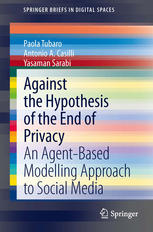

Most ebook files are in PDF format, so you can easily read them using various software such as Foxit Reader or directly on the Google Chrome browser.
Some ebook files are released by publishers in other formats such as .awz, .mobi, .epub, .fb2, etc. You may need to install specific software to read these formats on mobile/PC, such as Calibre.
Please read the tutorial at this link: https://ebookbell.com/faq
We offer FREE conversion to the popular formats you request; however, this may take some time. Therefore, right after payment, please email us, and we will try to provide the service as quickly as possible.
For some exceptional file formats or broken links (if any), please refrain from opening any disputes. Instead, email us first, and we will try to assist within a maximum of 6 hours.
EbookBell Team

4.0
76 reviewsSeveral prominent public voices have advanced the hypothesis that networked communications erode the value of privacy in favor of a transparent connected existence. Especially younger generations are often described as prone to live "open digital lives". This hypothesis has raised considerable controversy, polarizing the reaction of its critics as well as of its partisans. But how likely is the "end of privacy"? Under which conditions might this scenario come to be? What are the business and policy implications? How to ethically assess risks and opportunities? To shed light on the co-evolution and mutual dependencies of networked structures and individual and collective strategies towards privacy, this book innovatively uses cutting-edge methods in computational social sciences to study the formation and maintenance of online social networks. The findings confound common arguments and clearly indicate that Internet and social media do not necessarily entail the end of privacy. Publicity is not "the new norm": quite to the contrary, the book makes the case that privacy is a resilient social force, resulting from a set of interconnected behaviors of Internet users.